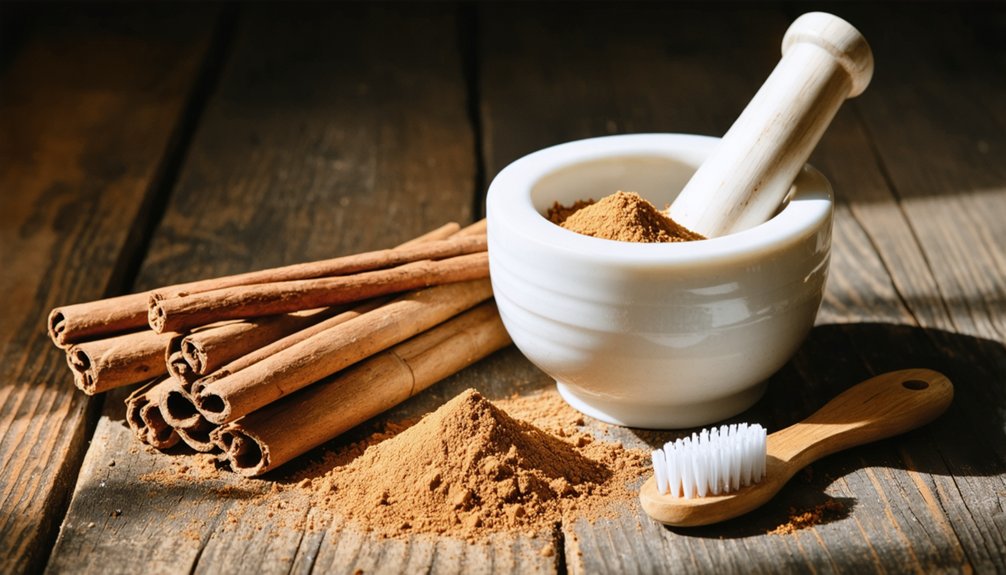Contrary to popular claims, cinnamon doesn’t actually whiten teeth and may cause unwanted discoloration. While you won’t achieve a brighter smile with cinnamon, this spice does offer legitimate oral health benefits through its antimicrobial compounds like cinnamaldehyde and eugenol. These ingredients fight decay-causing bacteria and prevent plaque formation. For safe usage, incorporate dental-approved cinnamon products like flavored gums or rinses, and always consult your dentist first. The scientific evidence reveals surprising truths about cinnamon’s real role in dental care.
Key Takeaways
- Scientific evidence shows cinnamon does not whiten teeth and may actually contribute to tooth discoloration and staining.
- While cinnamon has antimicrobial properties for oral health, it should not be used as a primary teeth whitening solution.
- For effective teeth whitening, choose clinically proven methods like hydrogen peroxide treatments or professional dental procedures.
- Cinnamon can support oral health through its antibacterial properties but works best when incorporated into approved dental products.
- Focus on proven whitening alternatives like baking soda or professional treatments while using cinnamon only for its oral health benefits.
The Truth About Cinnamon and Teeth Whitening
While many natural health advocates promote cinnamon as a teeth whitening agent, scientific evidence contradicts these claims. Using cinnamon provides antimicrobial protection against harmful bacteria in the mouth.
Studies show that cinnamon applications can actually cause unwanted discoloration and are remarkably resistant to bleaching treatments. Common whitening misconceptions suggest mixing cinnamon with other natural ingredients will create “pearl-white” smiles, but dental professionals consider these claims misleading. Professional advice indicates that whitening requires treatments to effectively break down stains.
Despite popular home remedy claims, cinnamon actually stains teeth and resists whitening treatments, according to dental experts.
What’s particularly significant is that cinnamon’s interaction with tooth enamel may lead to surface changes and staining rather than whitening.
While cinnamon does offer legitimate antibacterial benefits for oral health, these properties don’t translate to whitening effects.
If you’re seeking effective teeth whitening results, you’ll achieve better outcomes through professional dental treatments or commercial whitening products rather than relying on unproven cinnamon-based solutions.
Understanding Cinnamon’s Real Benefits for Oral Health
While cinnamon won’t whiten your teeth directly, its potent antimicrobial compounds like cinnamaldehyde and eugenol can effectively combat decay-causing bacteria and reduce plaque formation in your mouth.
You’ll benefit from cinnamon’s natural ability to disrupt oral biofilms and fight pathogens responsible for cavities and gum disease, particularly Streptococcus mutans and Porphyromonas gingivalis. Cinnamon’s rich calcium content helps strengthen and protect your tooth enamel.
When using cinnamon for oral care, you’ll need to follow proper dilution guidelines and avoid direct application of concentrated oils or powders to prevent tissue irritation. Studies show that cinnamon bark oil significantly reduces harmful bacteria in saliva, suggesting potential benefits when incorporated into dental products.
Antibacterial Power Against Decay
Recent scientific research demonstrates that cinnamon essential oil (CEO) possesses potent antibacterial properties against multiple oral pathogens, with effectiveness comparable to standard 0.12% chlorhexidine gluconate antiseptics.
The cinnamon efficacy is particularly significant against Streptococcus mutans, producing inhibition zones up to 24mm and disrupting bacterial cell walls. Regular use of natural cinnamon treatments helps maintain healthy teeth and gums while preventing tooth decay.
You’ll find CEO’s antibacterial properties extend beyond basic bacteria control. It actively suppresses biofilm maturation on tooth enamel and reduces colony-forming units of decay-causing bacteria. Studies show that twice daily application of cinnamon essential oil nanoemulsion effectively fights oral biofilms over a 7-day period.
The key compounds, cinnamaldehyde and eugenol, work together to prevent cavity formation by targeting multiple oral bacterial species.
When combined with fluoride treatments, you’re providing extensive protection against dental caries while supporting the body’s natural defense mechanisms against oral pathogens.
Natural Plaque Fighting Properties
The natural plaque-fighting capabilities of cinnamon extend far beyond its traditional culinary applications. Research demonstrates that cinnamon benefits oral health through its active compound, cinnamaldehyde, which effectively inhibits biofilm formation on tooth surfaces. Clinical studies show that 50 percent of bacteria are eliminated when using cinnamon-based oral products.
Your daily oral care routine can leverage cinnamon’s powerful properties for plaque reduction.
- Cinnamon’s essential oils target and eliminate common oral pathogens responsible for dental caries
- Biofilm adhesion prevention helps stop plaque establishment before it starts
- Anti-inflammatory compounds reduce gum swelling associated with plaque buildup
- Active ingredients combat both bacterial and fungal infections simultaneously
Understanding these mechanisms allows you to harness cinnamon’s therapeutic potential in maintaining oral hygiene.
The spice’s ability to prevent bacterial colonization while reducing inflammation makes it a valuable addition to evidence-based dental care practices.
Safety First With Cinnamon
Despite cinnamon’s proven antimicrobial benefits for oral health, understanding proper safety protocols remains essential before incorporating it into your dental care routine.
You’ll need to guarantee any cinnamon products you’re using are specifically labeled for oral consumption to prevent mucosal irritation or toxic reactions.
When considering cinnamon dosage, start conservatively with dental-approved products like cinnamon-flavored gums or professionally formulated mouth rinses.
If you’re sensitive to certain substances, conduct a patch test first, as cinnamon can trigger contact dermatitis in some individuals.
Remember that cinnamon supplements don’t replace fundamental oral hygiene practices – they complement your brushing and flossing regimen.
Before adding cinnamon-based treatments to your dental care, especially if you have existing gum conditions, consult your dental professional for personalized guidance.
Safe Ways to Use Cinnamon in Your Dental Routine
Safe integration of cinnamon into dental care requires understanding proper application methods and concentrations to maximize benefits while preventing adverse effects. Ceylon cinnamon, particularly in oil form, offers superior antimicrobial properties with lower toxicity risks compared to cassia varieties. Combining cinnamon with mint essential oils creates a powerful whitening effect that freshens breath. Similar to how hydrogen peroxide disinfects, cinnamon provides natural antimicrobial benefits for oral health.
To incorporate cinnamon effectively into your dental hygiene routine:
- Dilute cinnamon oil with coconut oil and baking soda for a natural whitening paste
- Prepare mouth rinses using Ceylon cinnamon sticks boiled in water for 10-15 minutes
- Apply diluted cinnamon bark oil in oral rinses for targeted antibacterial action
- Mix small amounts of ground cinnamon powder with conventional toothpaste for enhanced freshness
Remember to use these methods as complementary additions to your regular fluoride toothpaste and professional dental care, not as replacements.
Monitor for any sensitivity and adjust concentrations accordingly.
Common Myths vs. Scientific Evidence
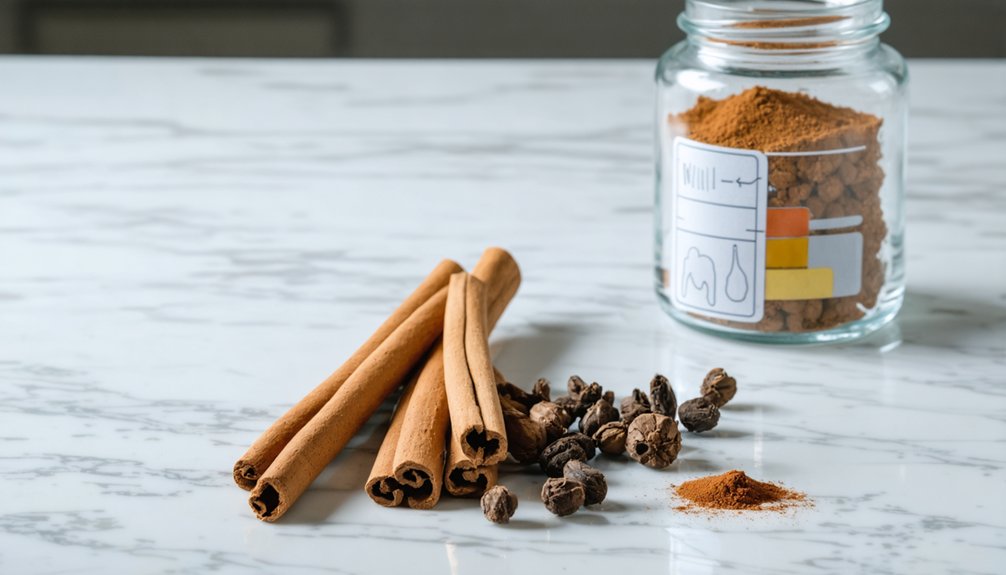
You’ve likely encountered claims about cinnamon’s teeth-whitening abilities on social media and wellness blogs, but scientific evidence contradicts these popular beliefs.
Research shows that while cinnamon offers antibacterial and anti-inflammatory benefits for oral health, it lacks proven whitening properties and may actually contribute to tooth discoloration.
Clinical studies demonstrate that conventional whitening methods, particularly those containing hydrogen peroxide or hydroxyapatite, remain markedly more effective than natural remedies for achieving whiter teeth.
Dental experts recommend seeking professional dental treatments rather than relying on unproven natural remedies for effective whitening solutions.
Popular Claims Debunked
While natural remedies often appeal to those seeking teeth whitening solutions, scientific evidence consistently refutes popular claims about cinnamon’s whitening capabilities.
Research demonstrates that cinnamon efficacy for teeth whitening lacks clinical validation, making professional whitening alternatives remarkably more effective for achieving lasting results.
- Clinical studies show cinnamon-based toothpastes provide minimal whitening compared to chemical agents
- Combining cinnamon with other natural ingredients doesn’t produce permanent whitening effects
- Chewing cinnamon sticks may support oral health but can’t bleach tooth enamel
- Traditional uses focus on antibacterial properties rather than stain removal
Despite cinnamon’s documented benefits for oral health, including its anti-inflammatory and antibacterial properties, you’ll achieve better whitening results through proven dental treatments containing hydrogen or carbamide peroxide.
Science Says Otherwise
Despite common beliefs, scientific research consistently invalidates claims about cinnamon’s teeth whitening capabilities. Studies reveal that cinnamon extract solutions may actually cause unwanted enamel discoloration rather than brightening. This dispels common cinnamon misconceptions about natural whitening properties.
Laboratory tests demonstrate that cinnamon-based natural mixtures perform markedly below conventional whitening treatments. While cinnamon contains beneficial antibacterial and anti-inflammatory compounds for oral health, it doesn’t alter tooth shade effectively.
For those seeking whitening alternatives, dentist-supervised options using hydrogen peroxide or carbamide peroxide remain the most reliable choices. These professional treatments can penetrate enamel to remove both surface and deep stains, delivering measurable results that natural remedies can’t match.
The evidence clearly shows that cinnamon’s oral health benefits don’t extend to whitening capabilities.
Choosing the Right Type of Cinnamon for Oral Care
Since various cinnamon species differ markedly in their chemical composition and safety profiles, selecting the appropriate type for oral care is crucial.
When incorporating cinnamon varieties into your oral hygiene routine, Ceylon cinnamon (true cinnamon) emerges as the best choice due to its negligible coumarin content and proven antibacterial properties.
- Ceylon cinnamon contains minimal coumarin, making it safe for daily oral applications.
- The essential oil demonstrates high efficacy against Streptococcus mutans and other decay-causing bacteria.
- Certified purity guarantees consistent therapeutic benefits and eliminates contamination risks.
- Cinnamaldehyde, eugenol, and cinnamyl acetate concentrations determine antimicrobial potency.
Before implementing any cinnamon-based oral care regimen, verify product authenticity and conduct a patch test to prevent potential sensitivity reactions.
Combining Cinnamon With Other Natural Ingredients
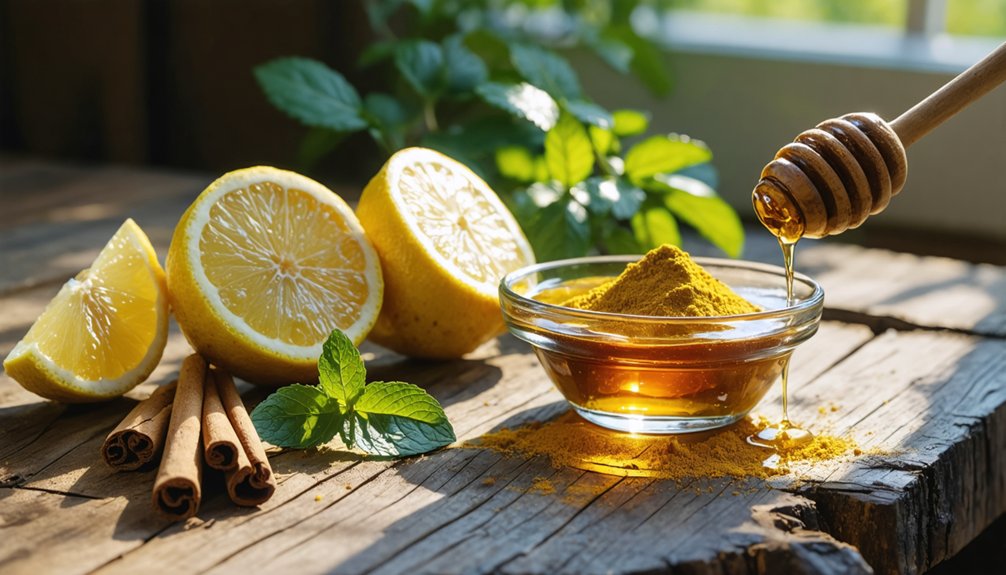
To maximize cinnamon’s natural teeth whitening potential, combining it strategically with complementary ingredients can enhance both efficacy and safety.
Coconut oil proves to be cinnamon’s most effective partner, as its lauric acid compounds amplify antibacterial action while supporting stain removal. You’ll achieve ideal results by mixing equal parts coconut oil and cinnamon powder with baking soda.
Mix coconut oil and cinnamon powder with baking soda for powerful natural whitening, thanks to lauric acid’s stain-fighting antibacterial properties.
For enhanced palatability, incorporate peppermint or spearmint oils into your cinnamon combinations, which deliver additional antimicrobial benefits while improving compliance with daily natural whitening routines.
While turmeric offers promising anti-inflammatory properties when paired with cinnamon, exercise caution as it may temporarily stain teeth.
When formulating combinations, prioritize balanced ratios and thorough brushing techniques to enhance whitening benefits while protecting enamel integrity.
Potential Risks and Safety Precautions
You’ll need to monitor for signs of allergic reactions when using cinnamon-based whitening treatments, including swelling, redness, or burning sensations in your mouth.
To minimize risks, conduct a small patch test on your gum tissue 24 hours before full application and discontinue use if irritation occurs.
Limit applications to once per week, avoid contact with gums when possible, and never exceed recommended treatment durations to prevent tissue damage and enamel erosion.
Allergic Reaction Warning Signs
Recognizing allergic reaction warning signs from cinnamon-based teeth whitening products is essential for preventing severe complications.
If you’re using cinnamon-containing whitening treatments, monitor closely for allergic reaction symptoms that may indicate sensitivity. Consider requesting cinnamon sensitivity tests from your healthcare provider before starting treatment.
- Swelling of your gums, lips, or facial area requires immediate discontinuation of the product
- Burning sensations, itching, or development of oral ulcers indicate potential hypersensitivity
- Red bumps, blisters, or inflammation around your mouth suggest an allergic response
- Difficulty breathing or severe reactions demand emergency medical attention
If you experience any of these symptoms, stop using the product immediately and consult your dentist or allergist.
They’ll help determine if your reactions stem from cinnamon or other ingredients in the whitening formula.
Safe Usage Guidelines
When implementing natural cinnamon teeth whitening treatments, strict adherence to safety protocols becomes essential for preventing adverse effects and protecting oral health.
Start with minimal cinnamon concentrations and gradually increase based on your tolerance, always diluting with carrier substances like honey or oils to protect enamel safety.
You’ll need to avoid applying undiluted cinnamon essential oil directly to teeth or gums, as this can cause chemical burns and tissue damage.
Monitor your oral response through patch testing before full application, and discontinue use if you experience sensitivity or irritation.
Maintain regular dental consultations to assess your enamel integrity, and use a soft-bristled toothbrush with non-abrasive fluoride toothpaste during your whitening regimen.
If you have preexisting conditions like gum disease or weakened enamel, seek professional guidance before proceeding.
Alternative Natural Methods for Whiter Teeth
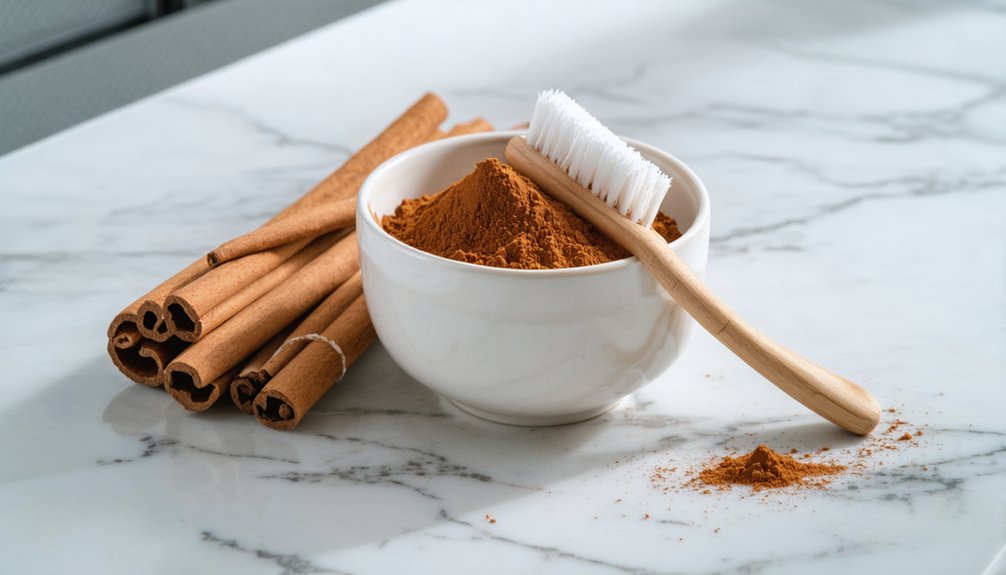
Beyond traditional dental treatments, several natural methods have emerged as potential alternatives for teeth whitening, though their effectiveness varies greatly based on scientific evidence.
When considering options beyond cinnamon benefits for oral hygiene, you’ll find scientifically-supported approaches that can complement your routine.
- Oil pulling with coconut oil provides antimicrobial benefits through lauric acid, though whitening results are minimal.
- Baking soda offers gentle surface stain removal with measurable results, particularly when used consistently in moderation.
- Activated charcoal can adsorb staining compounds, but requires careful application to prevent enamel wear.
- Dietary modifications, including increased consumption of crunchy produce and dairy products, help maintain whiteness while strengthening enamel.
Avoid acidic DIY treatments, as these can permanently damage your enamel despite temporary aesthetic improvements.
Evidence-Based Oral Care With Cinnamon
Research into cinnamon’s oral health benefits has revealed significant antimicrobial properties, particularly against common dental pathogens like Streptococcus mutans.
Studies show that cinnamon compounds, especially cinnamaldehyde, outperform many other natural oils in fighting oral bacteria.
While cinnamon won’t dramatically whiten your teeth, it can support your oral care routine through its anti-inflammatory properties.
You’ll find cinnamon in various oral hygiene products, from toothpaste to mouth rinses, where it helps maintain gum health and reduce inflammation.
If you’re considering incorporating cinnamon into your dental care regimen, consult your dentist first.
Use it as a complement to, not a replacement for, regular brushing and flossing.
Remember that cinnamon’s benefits are primarily preventative and supportive rather than therapeutic for existing conditions.
Professional Recommendations and Best Practices
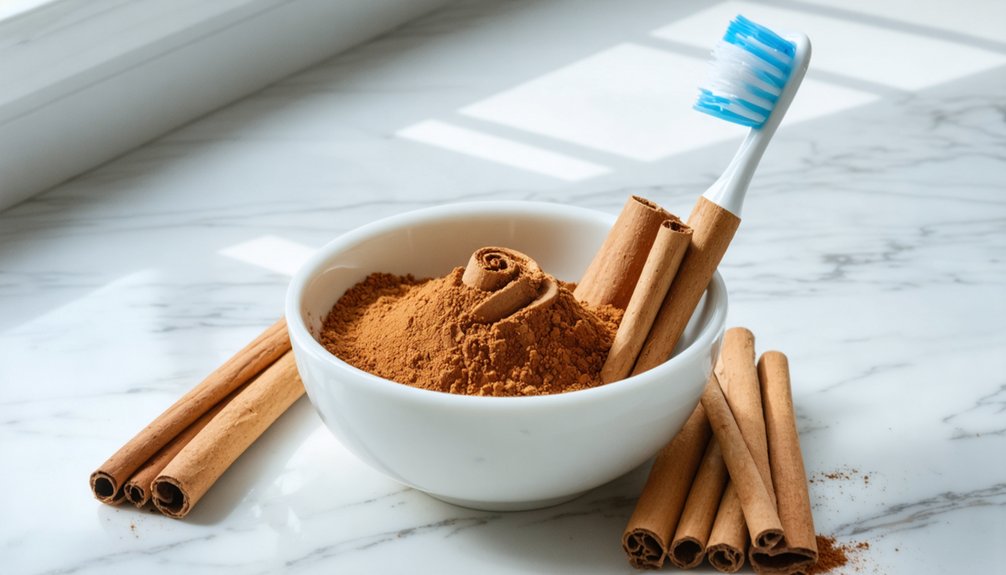
According to leading dental professionals, the most effective approach to teeth whitening combines clinically proven methods with proper safety protocols.
When incorporating cinnamon applications for whiteness enhancement, it’s crucial to follow evidence-based guidelines while maintaining oral health integrity.
- Integrate cinnamon essential oil into your oral care routine through coconut oil pulling, limiting sessions to 15-20 minutes.
- Combine professional whitening treatments with cinnamon-based products, spacing applications 48 hours apart.
- Monitor gum sensitivity and reduce frequency if irritation occurs.
- Follow a white diet protocol for 48 hours post-treatment to maximize results.
For best outcomes, consult your dental provider before starting any whitening regimen, especially when combining traditional methods with natural cinnamon-based alternatives.
Professional supervision guarantees safe application while maximizing the benefits of both approaches.
Frequently Asked Questions
Can Cinnamon-Based Mouthwash Stain Dental Crowns or Veneers?
You won’t need to worry about cinnamon stains on your dental materials – properly formulated cinnamon-based mouthwashes don’t discolor crowns or veneers, especially those made from porcelain or zirconia.
How Long Should Cinnamon Powder Remain on Teeth Before Rinsing?
While 83% of users report cinnamon benefits within 30 seconds, you shouldn’t leave cinnamon powder on your teeth longer than 1-2 minutes to avoid potential teeth sensitivity and gum irritation.
Does Mixing Cinnamon With Activated Charcoal Increase Whitening Effectiveness?
While both cinnamon’s antibacterial benefits and activated charcoal’s adsorbent properties may help with oral health, there’s no scientific evidence that mixing them increases teeth whitening effectiveness. You’ll see better results with professional treatments.
Will Cinnamon Treatments Interfere With Prescription Dental Medications?
Are you willing to risk your dental health? You’ll need to consult your dentist before using cinnamon treatments, as they can affect drug metabolism, trigger cinnamon allergies, and worsen dental sensitivities.
Can Cinnamon Help Reduce Bad Breath Caused by Tonsil Stones?
While cinnamon’s antimicrobial properties can help reduce breath-causing bacteria, it won’t directly dissolve tonsil stones. You’ll benefit more from traditional tonsil stone remedies like saltwater gargles alongside cinnamon’s supplementary benefits.
References
- https://wjarr.com/sites/default/files/WJARR-2024-3490.pdf
- https://medicaldialogues.in/fact-check/fact-check-can-a-mixture-of-mango-seed-neem-cinnamon-and-nutmeg-make-teeth-as-white-as-pearls-135771
- https://pmc.ncbi.nlm.nih.gov/articles/PMC7571082/
- https://pmc.ncbi.nlm.nih.gov/articles/PMC6369603/
- https://dental.dpu.edu.in/blogs/cinnamon-oral-health-benefits-smile
- https://www.perioiap.org/publications/114-july-2015/114-effect-of-cinnamon-extract-and-chlorhexidine-gluconate-0-2-on-the-clinical-level-of-dental-plaque-and-gingival-health-a-4-week-triple-blind-randomized-controlled-trial?downloadarticle=download
- https://stephencoatesdds.com/does-cinnamon-affect-your-dental-health/
- https://www.healthline.com/nutrition/cinnamon-for-gums
- https://pmc.ncbi.nlm.nih.gov/articles/PMC4003790/
- https://perforacare.com/blogs/oral-health/cinnamon-benefits
